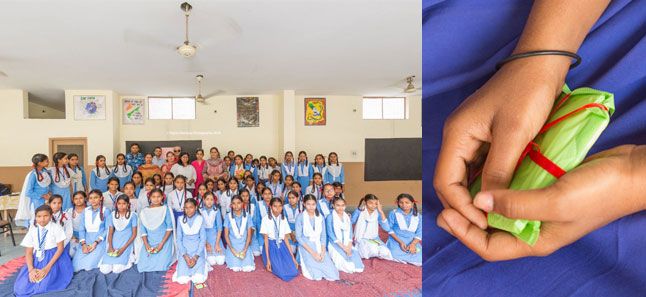25-year-old entrepreneur helps 5000 rural women move from using mud, cloth to sanitary pads
She is just 25-year-old, but, Pinaz Arora has been breaking stereotypes in rural India. A business management graduate from Ludhiana in Punjab, Pinaz has reached out to a whopping 5,000-odd rural women folk in and around the city in just three months, successfully spreading awareness about sanitary pads.
Pinaz found her calling very early on in life and later she came across Project Pavitra, an Art of Living initiative to spread awareness about menstrual hygiene. Equipped with passion, Pinaz, along with a 20-member support team, have tackled the issue head-on.
India has several problems to deal with at different levels, urban and rural. But, India is also blessed with youngsters like Pinaz, who are bringing a wave of change in their unique way. Once, she was visiting Dana Mandi, a nearby village, with her mother and got into a conversation on menstrual hygiene with women there. They came to know that village women were not only using cloth but mud and grass for blood absorption. This information left them in utter shock and disbelief as they could not have imagined this way of living for women in rural areas. Her mother had sleepless nights after hearing the difficulties these women faced. She urged Pinaz to reach out and help them.
“Initially, we thought we had to address the use of cloth, but when we heard that women use grass and mud for blood absorption, my mother and I were in shock. 20 volunteers are working for this cause now, which includes both men and women,” said Pinaz.
Thus, began Pinaz’s journey, and she found the purpose of her life. Initially, she visited the Giaspura and Tajpur Road slums and started giving the awareness talk. While at it, she came across The Art of Living’s Project Pavitra: a three-day program aimed at spreading awareness on menstrual hygiene amongst girls in rural India.
Project Pavitra gave Pinaz’s work a new dimension. “Through this project, I started working with the youth. I realized that if the new generation embraces and understands the process of menstruation, menstrual hygiene and self-care, then they will reach out to their families and bring about the required change,” she said.
Mission menstrual hygiene
Pinaz gathered The Art of Living volunteers to survey rural areas and understand their concerns. The survey showed that most women were clueless about menstrual hygiene. The study also highlighted the health problems that these women were facing. What lay ahead of the team was to start from scratch, and the first step was to organize an awareness session for these women.
“We just needed to spread out the mats and assemble women. We would interact with them for 45 minutes,” Pinaz said. She was speaking with such ease as if these events unfolded effortlessly. One could sense a feeling of urgency in Pinaz’s voice as she had seen the deplorable state of the women and had set her eyes on improving the lives of these women.
It is said that when one is committed to bringing a positive change, then things begin to fall into place without any extra effort. So, while she was on the project, Pinaz ran into an Art of Living volunteer who dealt with FMCG products. The volunteer immediately extended support and promised to provide sanitary napkins at a discounted rate for women relying on mud and grass for blood absorption.
Pinaz sprang into action and pooled in funds. She was aware that these poor women would not be able to afford sanitary napkins even at the discounted prices. Later, they gave the pads away for Rs.1 and pooled in the rest of the money contributed by the volunteers.
Debunking the menstrual myth
Pinaz speaks of menstrual hygiene unabashedly and yet thinks that she has a long way to go. She looks at this as an opportunity to make a difference and bring about a change.
Getting these 5000-odd rural women to stop using mud and to start using sanitary napkins wasn’t an easy job. But Pinaz has been able to fuel her passion for bringing the change, thanks to her working hours. “After finishing my MBA, I decided to something independently. I started a coaching center in Ludhiana. My working hours are from 4 pm to 9 pm. With free morning hours, I am able to work with volunteers for this cause,” she said.

Under Project Pavitra, Pinaz has also been reaching out to schools for conducting sessions for classes 5 to 10. Debunking myths around menstruation, Pinaz said the challenge was to make the women understand that they are not impure if they menstruate. Menstruating women in India have been considered apavitra (impure) for decades.“I told girls and women that this project is called pavitra, meaning pure. How can you be apavitra (impure) during periods? Many beliefs like prohibited entry into the kitchen and not working began because women needed the rest while menstruating. They need to make time to take care of themselves. The team explains this to the women, who, then, open up to talk about it more,” Pinaz shared.
The next step for Pinaz is to gather funds as the girls aren’t in a position to buy the sanitary napkins. She feels that only spreading awareness and teaching yoga asanas (poses) won’t solve the problem entirely.
Ask her if she feels overwhelmed by the task at hand, she says, “School principals are showing such interest in our efforts, so it makes the task much easier.”
Pinaz feels “attached” to the project and calls it ‘nothing short of a blessing.’ After a moment of reflection, reminiscing her journey thus far and with a thought about the future, she quips, “I am working with the future of the nation. What can be more satisfying than that?”
Courtesy : https://www.artofliving.org/











